Over the last few months I’ve been chatting with authors who, like me, write Family Sagas, (#familysaga) a genre that can cover many countries, years and cultures. I am thrilled that so many excellent writers agreed to meet here with me. I thought I’d completed these last week but I’m delighted that Madalyn Morgan has decided to join us here today and she will definitely be the last in this series before I move on to introducing the authors who will be at the Narberth Book Fair that Thorne Moore and I organise http://www.narberthbookfair.co.uk/-. I have read Madalyn’s novels and whole heartily recommend them.
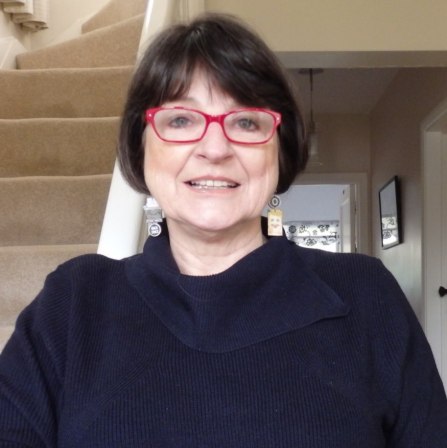
Hi Madalyn, glad to see you here at last
Hi Judith. Thank you for inviting me to talk about The Dudley Sisters Saga.
Tell us, what made you decide to write in your genre?
I am fascinated by the achievements of women in the first half of the Twentieth Century, in particular women who worked and served in WW1 and WW2. Also, my mother used to tell me about her life in the Second World War; the work she did, the dances she went to, and the letters she wrote to servicemen overseas. (She had a Polish penfriend named Vanda, which is my middle name.) My mum’s life was interesting, so when I did a writing course, and it came to the Biography module, I wrote about her. The tutor liked the work but said, as mum and I were both unknown, I should turn it into a fiction. At that time, Mum wanted to give back a brass aeroplane; a Wellington Bomber that was made for her by a Polish airman in 1940. He had died, but I found his son, and he was delighted with the plane. It was then that that I decided to set my novels in WW2. I had so many ideas; too many for one book, so I plotted four: Four sisters, four wartime careers, and four loves. I still have Mum’s biography. Her wartime experiences are only part of it. Her life as Landlady of a big pub from 1955 to 1983 is very interesting. It was occasionally dangerous too. One day I shall turn it into a fiction.
What other authors of your genre are you connected/friends with, and do they help you become a better writer in any way?
Funny you should ask, Judith. I do have several author friends who write in the genre – and one of them is you. I loved Pattern of Shadows, which I have in paperback. Changing Patterns is on my Kindle, ready to read during my writing break.
Well, thank you, Madalyn. You’re very kind. Tell us, do you think someone could be a writer if they don’t feel emotions strongly?
It’s possible, but I couldn’t. My emotions are on the surface all the time. It’s why I was a method actress. I believed in the characters I played. If I go to the theatre to see a play and I don’t enjoy it, it’s usually because one or more of the actors are acting, not reacting. It’s the same with books. If characters aren’t real, don’t communicate, I don’t enjoy the book. Anyone can put words on a page, but bringing them to life through a character, that’s what is important.
Do you try more to be original or to deliver to readers what they want?
Original, I think. I’ve never consciously tried to deliver. I couldn’t contrive an ending, for instance, that would be a lie. I’m lucky that my readers like what I write.
How do you balance making demands on the reader with taking care of the reader?
I don’t think I make demands on my readers. I make huge demands on myself. I care deeply for my characters and I have great respect for my readers.
Do you want each book to stand-alone or are you trying to build a body of work with connections between each book?
Both. The Saga is a collection of five novels, but each book does stand-alone. The first four books are the stories of four very different sisters; their lives, work and loves during World War 2. The sisters are together in the first novel, Foxden Acres, which is the oldest sister, Bess’s story. It’s in Foxden Acres that their futures are decided. Each story stands alone, but is interwoven with the other stories. When the sisters are at Foxden – for Christmas, a birthday or a wedding – they have to be at Foxden in their own stories. The same for events in the war – the bombing of Coventry, Battle of Britain, D-Day, etc. Everyone is affected in Foxden Acres, as they are in their own stories.
To ensure someone wasn’t enjoying Christmas in one book and overseas in another, I kept a day diary. Every time something significant happened in Foxden Acres I made a note of it, leaving four blank pages – one for each of the other books, and one for luck. I couldn’t have kept control of who was doing what, when and where, without the diary.
How many unpublished and half-finished books do you have?
Two plotted novels and a memoir. One novel to be developed from my mother’s biography, and a contemporary novel about a relationship between a young man and an older woman. He treats her badly, but he isn’t very bright. In the novel he gets his comeuppance! The memoir is about the time I lived on a reservation in Granite Falls, Minnesota, with Native Americans. In 1961, aged eleven, I was adopted into the Dakota Sioux tribe. One day I shall write about that amazing time in my life, and my wonderful Native American family.
What’s the most difficult thing about writing characters from the opposite sex?
The most difficult thing for me is getting into the head of a man without being biased, or influenced by my own experiences. I to use what I know about men – the good and the bad – to give substance to my male characters. I do with my male characters what I do with my females – I try to walk in their shoes.
What kind of research do you do, and how long do you spend researching before beginning a book?
For the first four novels in The Dudley Sisters’ Saga, I needed to know everything about WW2 – from the German invasion of Poland in September 1939 to Germany’s surrender in May 1945, ending the war in Europe.
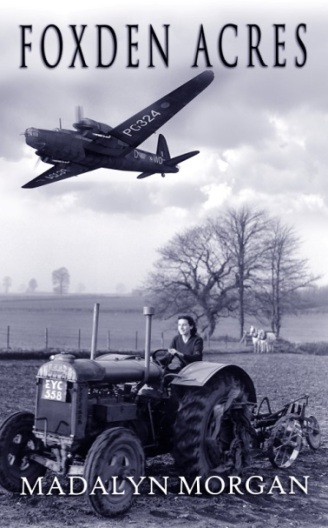
Research for my first novel took more than a year. Foxden Acres needed intensive research on, teaching, evacuation, the Land Army, farms, billets, and the Commonwealth Aerodromes near Foxden – Bitteswell and Bruntingthorpe. Also the RAF, Wellington Bombers – and the Polish airmen who escaped Poland and came to England to fly with the RAF, because they feature in the first novel. Foxden is near Coventry, so I needed to research the bombing of the city in November 1940.
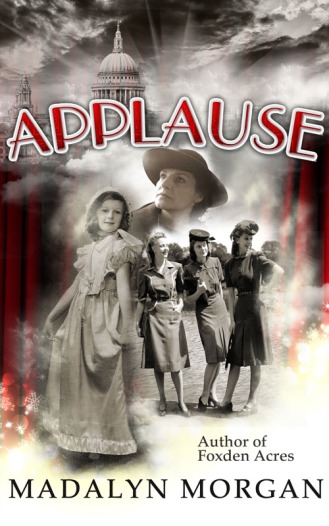
The second novel, Applause, was easier. I set it in one of the London theatres where I had worked as an actress in the 1980s. I still had to research the Luftwaffe’s blitzing of the East End, ENSA, the shows and songs of the time, fascists, Nazi sympathisers, GIs, and how Jewish Londoners were treated. But because I knew the West End, and had already done extensive research for Foxden Acres, research for Applause only took three months.
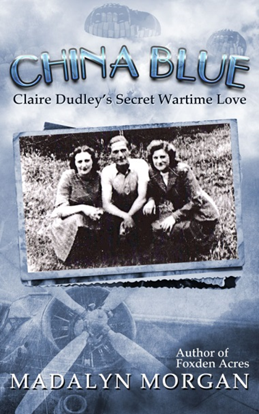
China Blue, the third book, set in England and France needed a huge amount of research. I was used to the process, but with this book it was also necessary to research as the story developed. What I knew about the Special Operations Executive, you could have written on the back of a postage stamp. So I researched the SOE and the training: Parachuting out of aeroplanes, surviving interrogation, living in occupied France, working with the French Resistance, sabotage, and the roads, rivers, and bridges that were held by the Germans. Although I made up the town of Gisoir, I needed to be familiar with parts of Paris. Thank goodness for Google-walk. China Blue was the most difficult of the four books to research and write. It was also the most exciting.
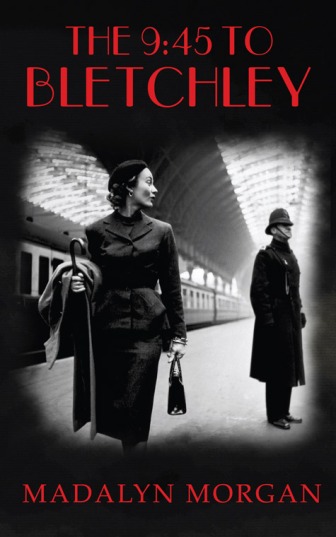
The 8:45 To Bletchley needed less research, again about 3 months. It begins on the night Coventry was bombed, November 1940, which I’d already researched. I needed to know about some of the work they did at Bletchley, but the facility was top secret, so if it didn’t directly affect Ena, I didn’t need to know about it. I researched engineering factories, MI5, poisons that put you to sleep but didn’t kill you, and I read some great biographies about spies.
Setting novels in such a well documented time as WWII means you have to get your facts right. Thank goodness for Google and Amazon. When I wrote Foxden Acres my research was done by reading books, now it’s a 50-50 mix.
What do you think most characterises your writing?
I’d like to think it is strong believable characters and interesting plots. To me the characters are real people. I put myself in their minds and walk in their shoes, as far as possible, because doing that gives the characters life.
How do you select the names of your characters?
I don’t select names. They come with the characters.
What was your hardest scene to write?
A rape scene.
What one thing would you give up to become a better writer?
Alcohol. I love a glass of red wine with my dinner, but if I’m writing after I’ve eaten, I don’t drink. I didn’t drink before going on stage either. Afterwards is another story.
Does writing energise or exhaust you?
Writing energises me. Proof reading exhausts me.
What would be the advice you would give to your younger writing self?
Stop doubting yourself. Have faith you can do it, and you’ll do it.
As a writer, what would you choose as your mascot/avatar/spirit animal?
My Muse is a grey haired old lady sitting at a typewriter. In my head she’s saying, “Get on with it, dear? Writer’s block, dear? Not me dear!”

Love her!!
Okay, now tell us, what was the best money you ever spent as a writer?
Buying my first computer. Before that I tapped out my work on an old typewriter. Spelling is not my strong suit. I got through a lot of Tipex.
If you didn’t write, what would you do for work?
I’d expect I’d still be acting. There’s very little work for actresses of my age, so I’d probably be doing temp jobs to pay my mortgage. Perish the thought.
Have you ever had writer’s block?
Yes. When three close friends/relatives died within three months of each other, I was devastated and couldn’t write a shopping list. I honestly wondered if I’d ever write again.
What is the first book that made you cry?
Gone To Earth by Mary Webb.
What do you think is the best way to market your books?
Twitter. I create posters and add captions and book links to advertise my books. As an Indie Author it’s important to Tweet, and to Re-Tweet other authors. This poster for China Blue is one of my favourites.
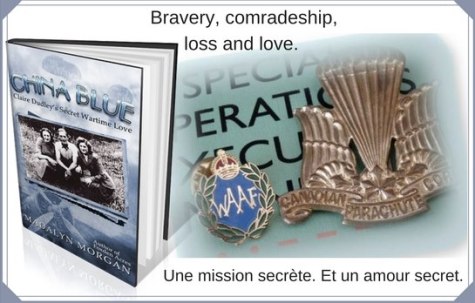
Do you read your book reviews? How do you deal with bad or good ones?
Yes, I read reviews. I thank the person, share to my author page on Facebook and Tweet them. I’ve been lucky. I’ve only two bad reviews, both for my first novel, Foxden Acres. One said, ‘Reading FA was like pulling teeth, I didn’t get beyond the second page.’ I can’t remember the other one.
Can you share some stories about people you met while researching this book?
I had tea with Heather Craven, the owner of Misterton Hall, which, in my first novel Foxden Acres is Foxden Hall, and in my last novel is the Foxden Hotel. I found several things interesting. When I was a Saturday girl in a hairdressing salon in 1965, I used to wash Mrs Craven’s hair. Another thing, in Foxden Acres I describe the grounds, the lake, the steps leading from the French windows to the tailored lawn where there had once been peacocks – and when I went there to take a photograph of the hall for Foxden Hotel’s book cover, it was almost as I had described it. But the most wonderful thing was, my grandfather, who I never met, was the head groom at Misterton Hall between WW1 and WW2. Heather showed me the stables where he had worked. It was very moving.
When I was writing The 9:45 To Bletchley, I visited Bletchley Park. While I was there, I met a lady who, as a child, had lived in the cottage next door to Dilly Knox’s codebreaking ladies. She took me under her wing. I felt very privileged.
Would you like to talk about your latest book here?
Thank you, Judith, I’d love to. I’ve just finished proofreading the digital copy of Foxden Hotel, the 5th novel in The Dudley Sisters Saga. It’s now ready for publication – Kindle and paperback – on June 10.
Foxden Hotel opens on New Year’s Eve, 1948 – ten years after the first book in the saga, Foxden Acres, which began on New Year’s Eve, 1938.
![Pageflex Persona [document: PRS0000446_00069]](https://judithbarrowblog.com/wp-content/uploads/2017/06/foxden-hotel-book-cover.jpg?w=357&h=571)
The war is over. It is time for new beginnings.
Celebrating the opening of Foxden Hotel, New Year’s Eve 1948, an enemy from the war years turns up. He threatens to expose a secret that will ruin Bess’s happiness and the new life she has worked so hard to create. Bess’s husband throws the man out. So is that the last they see of him? Or will he show up again when they least expect?
Bess had hoped fascism was a thing of the past, buried with the victims of WW2. Little does she know the trouble that lies ahead, not only for herself, but also for her family.
Oh, do love the sound of that. Well, Madalyn, all I can say is thank you for rounding off this series. I’ve been fascinated by your answers today. Good luck with Foxden Hotel, I hope it flies off the shelves.
Please give us all your links.
Glad to. My novels:
Foxden Acres: http://www.amazon.co.uk/dp/B00BCX59LE/
Applause: http://www.amazon.co.uk/dp/B00J7Y5LCW/
China Blue: http://www.amazon.co.uk/dp/B00XD85NQW/
The 9:45 To Bletchley: https://www.amazon.co.uk/dp/B01GEVW3Z8/
Foxden Hotel: https://www.amazon.co.uk/dp/B071LDYD2D/
Writing Blog: http://madalynmorgan.blogspot.co.uk/
Fiction Blog: http://madalynmorgansfiction.blogspot.co.uk/
Facebook: www.facebook.com/madalyn.morgan1
Twitter: https://twitter.com/ActScribblerDJ


Thanking your reviewers is such an excellent and thoughtful thing to do. Do you thank your Amazon reviewers?
LikeLiked by 1 person
Thanks for dropping by Adrienne. I must admit I haven’t been able to work out how to thank Amazon reviewers unless they share on social media… then I do. Hmmm…
LikeLike
Judith, if you click like beneath the review a comment box appears. I have to say I mostly thank people on Twitter and Facebook too.
LikeLike
Oh, that’s good to know. Thanks, Maddie
LikeLike
Yes, I thank everyone, Adrienne. 99.9% of my reviews are Amazon verified. As an Indie author, I’m grateful to Amazon for giving me the opportunity to share my work with readers on Kindle, as well as in paperback – through CreateSpace.
LikeLike
I must do that in future. Thank you.
LikeLike
How do you thank them? I’d like to do the same. Do you just leave a comment?
LikeLike
Madalyn says you click on the comments/like button, Adrienne. I’ve never thought to do that
LikeLike
Such a great way to show gratitude. I love it!
LikeLike
And so do I, Adrienne… Now I know! x
LikeLike
What a terrific interview! I loved the combination of entertainment and how Madalyn developed as a writer.
LikeLiked by 1 person
Thanks Barb. I’ve met some great women writers during these interviews. Seems not many men write family sagas… well I didn’t find one who wanted to join in. I love Madalyn’s books; it was interesting to find out how she became so successful.
LikeLiked by 1 person
Judith’s layout and design highlighted the different aspects of my life so well. Clever. It’s why her Blog is so popular. Thanks for reading and commenting, Barb.
LikeLiked by 1 person
And thank you, Madalyn. So glad you’re pleased with the post
LikeLike
Reblogged this on Don Massenzio's Blog and commented:
Meet author Madalyn Morgan, the latest featured family saga author on Judith Barrow’s blog.
LikeLiked by 1 person
Many thanks, Don
LikeLiked by 1 person
Thank you, Don. it’s very kind of you to Reblog. xx
LikeLiked by 1 person
Pingback: My Series of #FamilySaga Authors. Today with Madalyn Morgan #MondayBlogs | madalynmorgan
What a thoroughly enjoyable interview and I’m looking forward to reading the Foxden novels. I was interested in what Madalyn said about being told to turn the biography of her mother into fiction because she isn’t famous. I love reading biography and memoir and am far more interested in reading about ‘un-famous’ people. I think, perhaps, because they feel more authentic with less being censored out. I think your mum’s life sounds fascinating.
LikeLiked by 1 person
Thank you, Mary.I love Madalyn’s work – always something to get totally immersed in.And, yes, her mum’s life does seem to lend itself to a good story.
LikeLiked by 1 person
This has been a lovely series, Judith, and glad you had the opportunity to include Madalyn ♥
LikeLiked by 1 person
Thank you, Tina. I’ve certainly met some wonderful writers over the last months.x
LikeLiked by 1 person